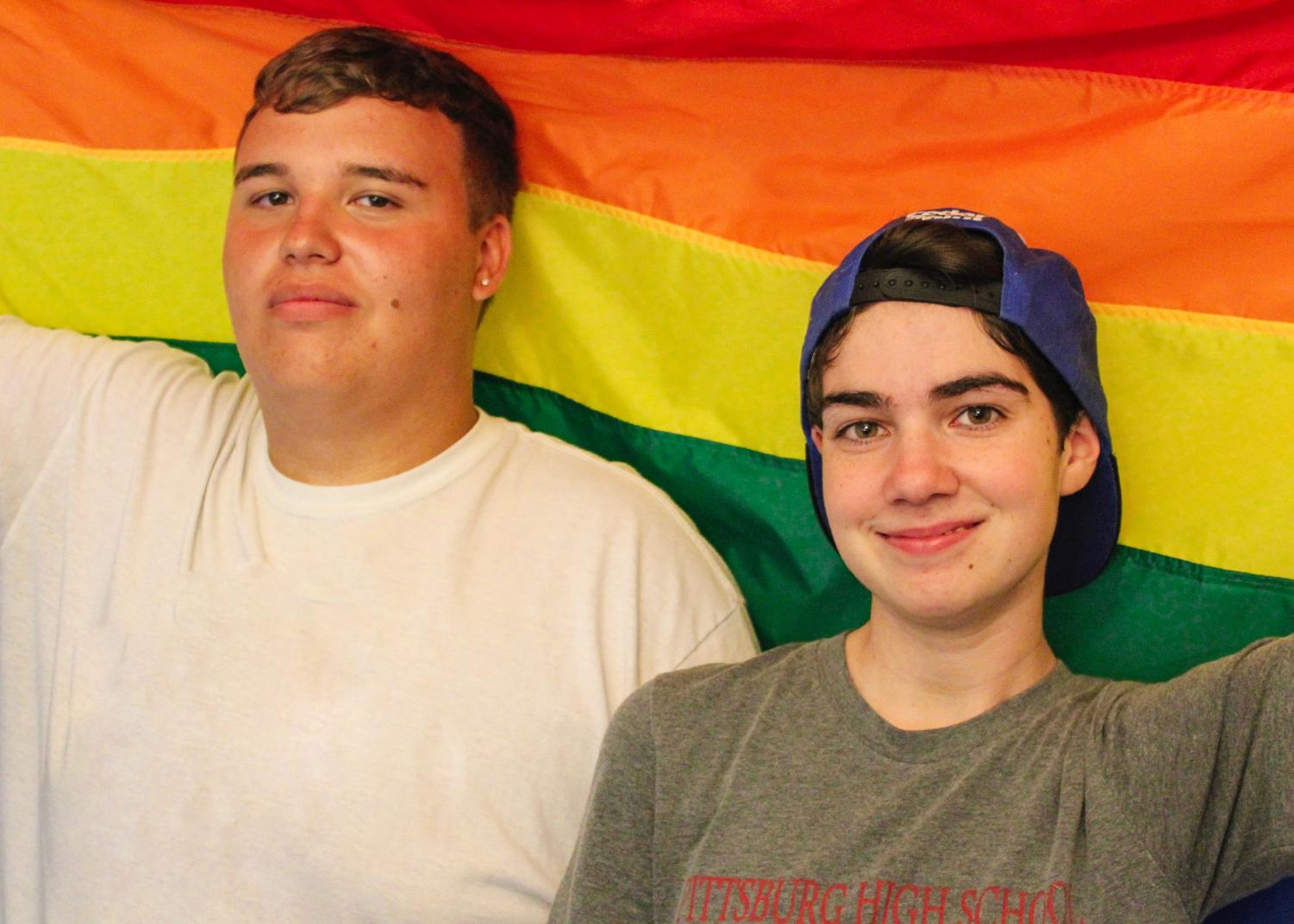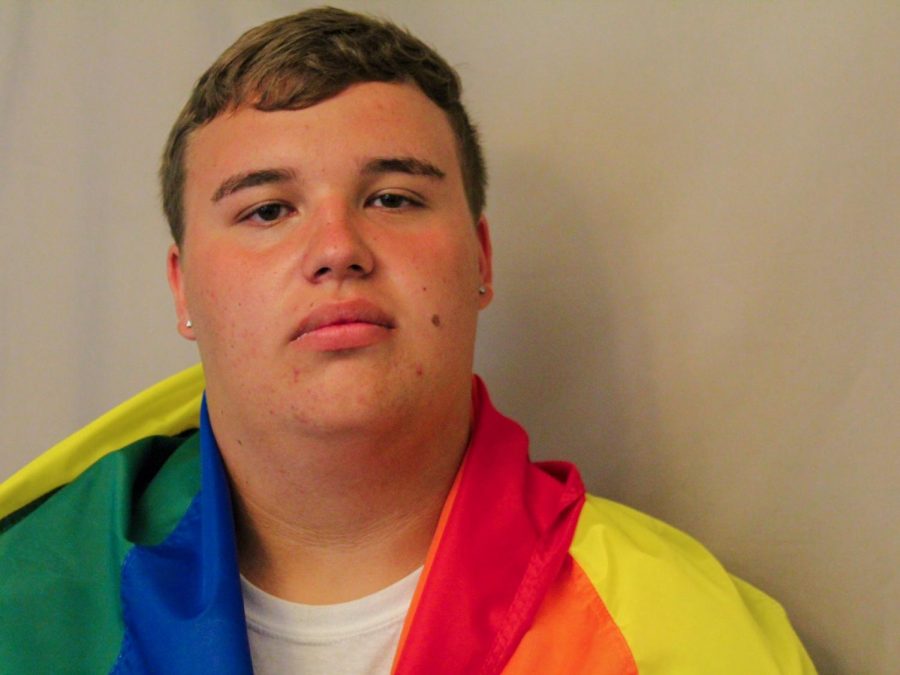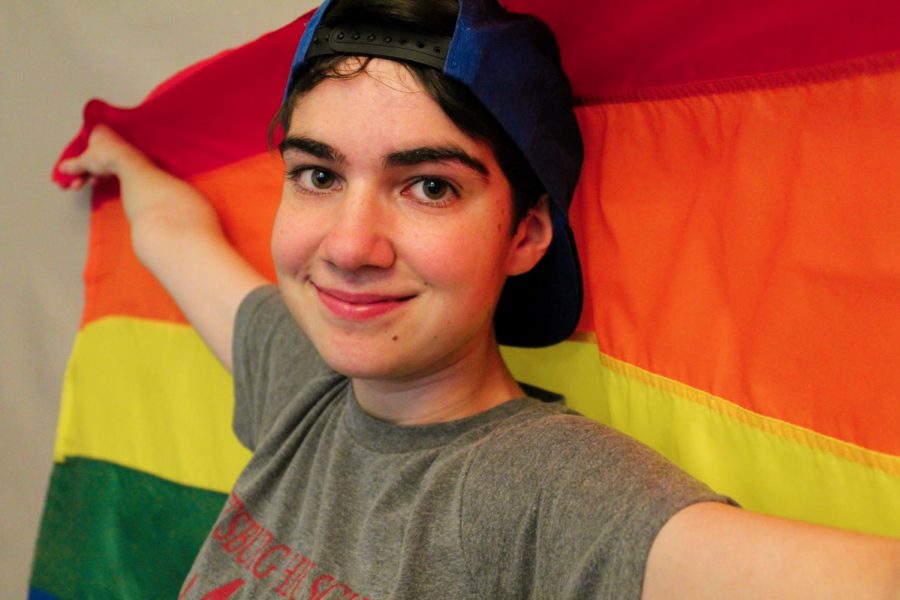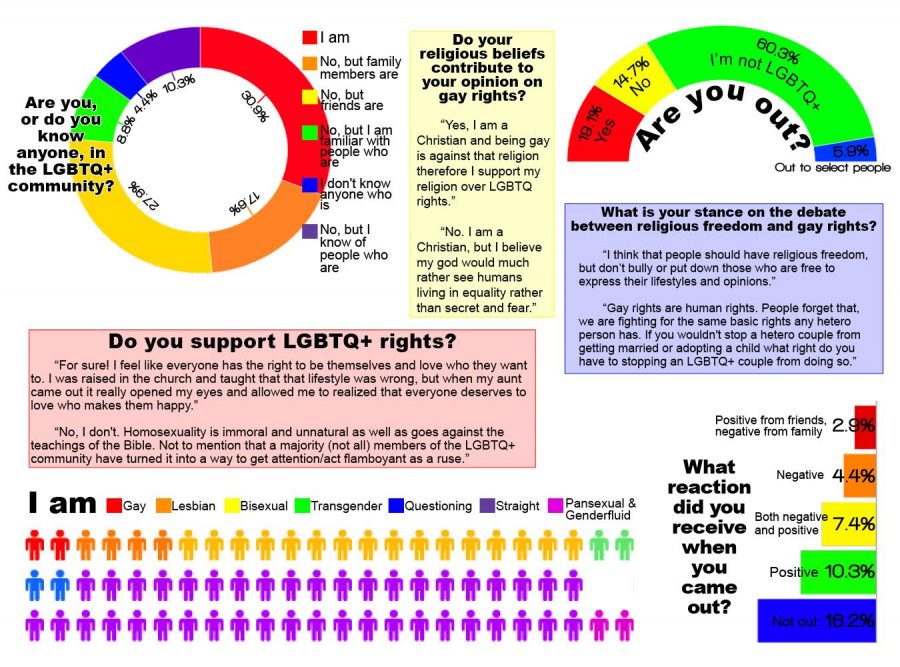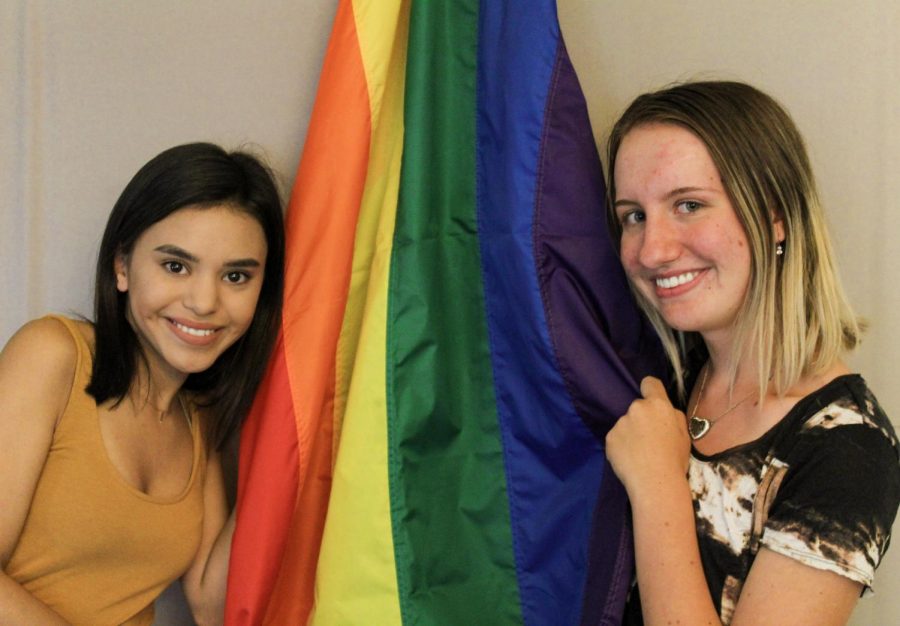Your donation will support the student journalists of Pittsburg High School - KS. Your contribution will allow us to purchase equipment and cover our annual website hosting costs.
SPECIAL COVERAGE: LGBTQ+ youth in PHS
In light of Pride month, Ibarra and Konopelko offer their thoughts on LGBTQ+ issues.
July 7, 2018
It’s hard to live in a body that you feel you were never born to live in. It’s hard to feel accepted when others say you are unnatural because of who you love.
It’s also hard to put yourself in the shoes of a person who has dealt with all of these difficulties firsthand.
But it’s easy to turn your back on these struggles when they don’t affect you.
The stories you’re about to read differ from our typical online coverage. We planned on spending the summer covering only usual student events and activities.
But in early June, the Supreme Court ruled in favor of a Colorado baker who denied services to a same-sex couple, sparking a national debate on religious freedom versus LGBTQ+ discrimination.
This decision fell on the same month as the legalization of gay marriage in 2015 and the start of Pride Month, a month celebrating the LGBTQ+ community.
On a month that we come together to celebrate this community, the Supreme Court failed to support it.
Though the legalization of gay marriage was a win for gay rights, it didn’t guarantee acceptance of the LGBTQ+ community in our nation.
Just two years ago, 49 people were killed while 53 others were wounded in a homophobic terrorist attack in Pulse Nightclub, a gay nightclub in Orlando.
Even worse, lesbian, gay, bisexual and questioning (LGBQ) persons are more likely to attempt suicide than heterosexual persons. Transgender youth are even more likely to attempt suicide than their LGBQ counterparts.
Pittsburg is not excluded from these statistics. Our youth suffer from the lack of tolerance in our nation and our town.
Students who have walked our hallways, who are in the LGBTQ+ community, are marginalized.
These living testimonies you’re about to read are proof of the magnitude of this national issue. Though they don’t represent all LGBTQ+ students, their experiences are still valid.
Although we spent this month talking to six students in the LGBTQ+ community, we decided to feature only two. All of them had their own unique issues they dealt with, yet they persevered.
We stand with all persons in the LGBTQ+ community, even though they were not all featured in our special coverage. We also stand with all of the students we could not feature because they were still closeted.
We also stand in solidarity with the LGBTQ+ community members that committed suicide because they lost the battle against hatred.
For some of the students we talked to, coming out meant doing it at their own speed with supportive friends and family members.
But for others, it meant being ostracized by society.
In reading these stories, take a moment to put yourself in the shoes of these two brave students — one of hope and one of perseverance.
To the LGBQ students: you are not worth less than a straight person. Your love is no different than one of a straight person — it’s just as pure.
To the transgender students: you’re not worth less than a cisgendered student. Your gender identity is valid.
To the closeted students: we wait for you with open arms.
This community is deeply wounded by high suicide, sexual assault and substance abuse rates.
In this coverage, we acknowledged these issues, but we still celebrate you. We celebrate your bravery in coming out and accepting your identity. We celebrate your perseverance in coping with bigotry.
We celebrate your history and what is best to come.
Yes, June is over and people may have stopped talking about pride. But taking pride in your identity lasts a lifetime.
These issues don’t just come up in June and disappear the week after; they should be addressed regardless of the time of year.
It’s because of this, that we published this special coverage a week after Pride Month is over — to keep the conversation going.
On this day, reflect on the issues presented by reading the stories of those close to home.
The roots of LGBTQ+ Pride Month
Hover over the buttons to get to know some of the important dates of LGBTQ+ history in the U.S.
Photo by: Ximena Ibarra
“I may not know what I’m going to do, but I know who I am,” Kelsey said. “I am Tayten Kelsey. I am proud of myself. I am happy to be who I am.”
Learning to love yourself for who you love
Kelsey faked a smile for two years before he grew comfortable with his sexuality.
Faggot. Queer. Freakshow.
Those three words were racked up in senior Tayten Kelsey’s head. They’d slipped out of the mouths of his peers in the hallways of PHS. They’d slipped out of the mouths of his own family.
They’d made him feel unconfident at a time when he was trying to figure out who he was.
One night, after a long day at school, Kelsey couldn’t handle hearing them anymore or accept himself. He cried, struggling to understand why people couldn’t see him from himself — a nice guy. A debater.
So he popped a combination of prescriptions into his mouth, ready to end his life.
“For a long time, I felt worthless, like a burden,” Kelsey said. “That night, I really did feel that way. I just remember thinking that life would be easier for everyone if I just wasn’t there.”
But a few hours later, Kelsey’s best friend called him. Mason Sutton, a 2018 graduate, yelled through the phone about how much he loved him.
Sutton stayed on the phone with him for hours, telling him how to get the medications out of his body. Kelsey ultimately flushed the medicine out, and survived.
“He was going through a rough time in his life,” Sutton said. “I think I was just there for him and I think that meant a lot to him. I am his friend and I love him.”
But for Kelsey, this was just another day. That year, he was struggling to find himself, and his identity. He cried after school on a frequent basis. His absences piled up because he didn’t want to show people he was weak.
He couldn’t accept who he was.
“I will say this over and over again to whoever; I don’t want anyone to ever feel how I felt,” Kelsey said. “I don’t wish that upon the worst person that I can think of.”
***
It’s been a year since he persevered and found his way out of this “dark place,” filled with substance abuse and depression.
But it all started in eighth grade when he realized that he was attracted to boys.
“That realization terrified me,” Kelsey said. “I didn’t know how people would react and I didn’t really know how to come out. I didn’t know how to handle my situation.”
So he found a word that was easier for him to say instead — bisexual. He came out as bi to a few of his friends.
“I thought maybe it would kind of just happen and go away,” Kelsey said. “It was easier that way.”
Every day, he falsely convinced himself that he wasn’t gay — until one night when he watched Connor Franta’s most recent YouTube video. Franta — a role model to Kelsey and openly gay YouTuber with millions of subscribers — spent the video talking about his experience coming out.
“He looked so happy and that was something that I just really felt I could have,” Kelsey said. “I decided it was my time to be happy for who I was wanting to be.”
A few weeks into his freshman year, Kelsey told his eight closest friends that he was gay. One by one, they stopped talking to him and exited his life. For four months, Kelsey had no friends.
“The first part of the struggle was losing my friends because I was hoping for acceptance and I didn’t receive it,” Kelsey said. “I was very upset.”
He stopped going to social functions. He shut everyone out of his life as much as he could, aside from a few acquaintances.
“I didn’t have the confidence to make friends,” Kelsey said. “I didn’t really have the confidence back then to do much.”
He thought he would stay without friends forever, with no one to talk to, until he met Sutton through a mutual acquaintance.
Sutton, a confident guy who didn’t care about what anyone thought about him, talked to Kelsey any time he needed him to, offered advice and gradually started building him up.
He complimented him and reminded him that he was proud of him and that he’d be his friend, no matter what. To this day, he still does.
Kelsey soon became a part of Sutton’s “squad,” which consisted of alums Danny Bell, Ethan Tomasi and Patrick Sullivan.
“We include him in things that we do,” Bell said. “He’s gay, whatever, but we don’t treat him like a different person. He is one of our boys, and that’s just the deal.”
As soon as Kelsey joined the group, his confidence started going up. He punched away the self-doubt that consumed him and made him turn to substance abuse, anxiety and self-hatred.
“I think all of them really have, in a way, saved my life — whether it was you know, calling me at the phone at midnight or just being there for me when they didn’t even know they were there for me,” Kelsey said.
He started to ignore what anyone thought of him, with the exception of the boys.
“His self-confidence has gone up because we don’t care about what people think about us, so he shouldn’t either,” Sutton said.
***
Kelsey’s family members, however, didn’t know he was gay.
He worried that his family wouldn’t accept his sexuality. But after hearing his friends’ words of encouragement, he knew it was time to tell his family who he really was.
He had one of his friends tell his mom, Kasey Zimmerman, at a debate tournament in the fall of his sophomore year. When they drove home from the tournament, they talked about it.
“This is who he is and you’re either okay with that or not and he’s okay with that,” Zimmerman said. “He’s my son, I love him no matter what. If I was in his shoes, I don’t know if I could be as confident as he is about it.”
Kelsey told his grandma and grandpa next, who both also “didn’t blink an eye.”
“There is nothing [he] could do in this world, ever, to make us not love him or feel any differently,” said Maricia Stafford, Kelsey’s grandma. “We’re proud of him.”
Though Kelsey’s family members support him and his decision, they still fear the possible backlash he could receive for it.
“[I was] not upset because he was gay, but upset because [I knew] what this world is like and some of the people in this world,” Stafford said. “Just the bad stuff in the world where people are such homophobes. That thought crossed my mind and you can’t help but think that.”
Regardless, Kelsey said he’s grateful for the support he received and views himself as more fortunate than most people in his situation.
“I am lucky because of the people that I’ve found,” Kelsey said. “I feel like everyone goes through a crucible, whether it be something small or something big like how I went through. It either makes or breaks you and I think it made me.”
He wants to start a Gay-Straight Alliance (GSA) chapter at PHS to provide an environment where people can talk about LGBTQ+ rights. He said he would talk to anyone in a heartbeat if they were in a similar situation.
“[People] have told me that my confidence has inspired them,” Kelsey said. “I am confident in myself and who I am. I feel like them being able to see that really helps.”
He no longer has to fake a smile on his face — he is finally happy, and in love with himself.
“I may not know what I’m going to do, but I know who I am,” Kelsey said. “I am Tayten Kelsey. I am proud of myself. I am happy to be who I am.”
Photo by: Ximena Ibarra
“It really hit me at the end of middle school when I realized ‘You know what, I don’t have to pretend that I am a girl,’” Barnhisel said.
Transitioning from Kylee to Ky
Barnhisel stepped out of the closet as transgender into the open arms of supportive friends and family members.
As his hairdresser snipped the long locks of hair off of Ky Barnhisel’s head four years ago, Barnhisel felt liberated in a way he hadn’t felt before.
“Honestly, it was really freeing,” Barnhisel, a 2018 graduate, said. “I never liked my long hair. It didn’t feel me, but once I got it cut short, I felt like a new me in a way.”
Though Barnhisel was born as a female, he identifies as a male. Barnhisel began realizing his gender identity before his haircut but never acted on it until that day.
Everyday comments made him wary of his gender identity. Barnhisel did not like compliments from others such as “pretty.” And when he would hold doors for people, a “Thank you, sir” felt more real to him than a “Thank you, ma’am.”
As a child, he wouldn’t feel comfortable in dresses and bows. When he had the freedom to choose his wardrobe, he steered away from the girls’ section.
“It really hit me at the end of middle school when I realized ‘You know what, I don’t have to pretend that I am a girl,’” Barnhisel said.
So he found a way that he thought would be easier to accept himself — calling himself gender non-binary.
“I didn’t exactly feel like a female, but I didn’t know what else [to call myself],” Barnhisel said. “I just thought I was born on what I was born with, and was stuck like that.”
He didn’t even know that being transgender was an option for himself during his time in middle school and part of high school.
“I didn’t realize it at the time but looking back, [middle school] was definitely a rough couple of years,” Barnhisel said. “I felt like no one was my friend and that was especially hard because I realized I didn’t love myself at the time.”
Eventually, Barnhisel found enough love and confidence in himself to accept his gender identity. This self-love, which was boosted by caring friends and family members, led him to come out as transgender.
***
In January, nervousness swept over Barnhisel as he texted fellow graduate Savannah Jones to disclose his gender identity.
“He was scared I wasn’t going to be friends with him anymore because he knows my beliefs,” Jones said.
Jones is a Christian and believes that the Bible accepts the LGBTQ+ community.
“The Bible says that, yes, being trans and gay is a sin, but what I believe is that Jesus loves you anyway,” she said. “No matter what sin it is, I still need to be there and show them the love of Christ just how Christ showed his love to me.”
For Jones, this meant loving Barnhisel unconditionally and continuing to learn about the LGBTQ+ community through her best friend.
“I feel like that took a weight off of his shoulders,” she said. “I just wanted to make sure he knew I wasn’t going to leave him.”
As months went on, Barnhisel began openly declaring his gender identity.
During a forensics tournament, Barnhisel noticed that his friend, 2018 graduate, Meghan Hess, had a bad round. So to cheer her up, he told her that he’s transgender.
“[For the] first time in a really long time, I saw him genuinely happy and confident in himself,” Hess said. “It was just a tremendous moment for our friendship.”
Hess noted several differences in Barnhisel after he came out. She also affirms that Barnhisel remains the same friend to her, but he merely uses different pronouns.
“Ky has always been Ky, no matter what name he used to be,” Hess said. “He just explored that avenue and found who he is.”
Hess and Jones noted Barnhisel’s change in demeanor and attitude as he revealed his true self.
“It’s been a magnificent experience to see the confidence and the strength and this personality blooming,” Hess said. “I know Ky is shaping out to be a work of art.”
Coming out as transgender fortified some friendships, but other friendships simply faded away from Barnhisel’s life.
“If they’re not going to be there for me then I don’t need them,” he said. “Now, I know who’s got my back.”
Barnhisel’s support does not end with his friends —it expands to his family as well.
Although his mother and sister both support him, they declined to comment for this story.
Though Barnhisel has not personally encountered any intolerance, he does recognize society’s attitude towards his own community.
“I always see bullying and [transgender] people getting attacked,” he said. “Even though I haven’t personally been a victim to that, it does happen, and you can’t ignore that part. If you’re going to be true to yourself, you have to be aware of those risks.”
***
As someone who went through the process of accepting themselves, Barnhisel has advice for persons in the transgender community.
“You got to look after yourself because not everyone is going to be supportive,” Barnhisel said. “Just remember that you are you and that no matter what anyone else thinks, you’re still going to be the strong individual that you are.”
High school has allowed Barnhisel to be that strong individual he wants others to be, but college will offer more opportunities for him to blossom as a transgender man.
“I’m definitely going to start introducing myself as Ky,” he said. “I’m going to change my name to Kyler in the future.”
Along with a name change, Barnhisel plans on pursuing gender reassignment surgery some day.
“I don’t think I’ll do it anytime soon, but I feel like it’s going to be the most comfortable thing for me,” Barnhisel said. “It doesn’t matter what other people think, I’m doing it for myself.”
Q&A: Legalization of Gay Marriage in the U.S.
“Where were you on the day gay marriage was legalized and what did it mean to you?”
Community Survey: LGBTQ+ rights and religious freedom
The Booster Redux conducted this survey of 68 community members to represent Pittsburg’s diverse opinions on the debate of religious freedom versus LGBTQ+ rights.
To the LGBTQ+ community:
You’ve now reached the end of our special coverage on Pride Month. A special thank you to all of our hardworking staffers who made it possible and the brave students who shared their stories with us.
It’s the end of our coverage, but it’s not the end of the conversation. This is where we need your help. As a community, we should work to accept our LGBTQ+ youth and call out bigotry. We were inspired by our LGBTQ+ students in our school and our nation.
To those in this community — your voice matters and we hear you.
You are loved.
Ximena Ibarra, Managing Editor
Nicole Konopelko, Editor in Chief

